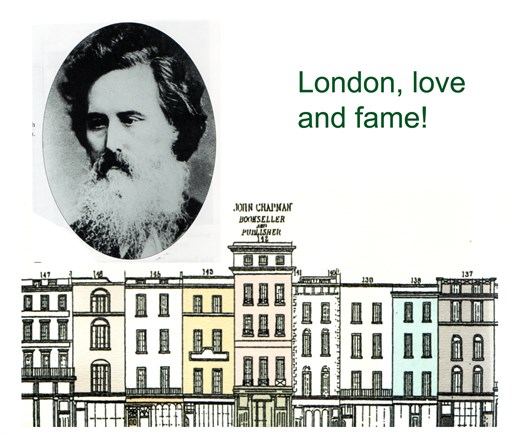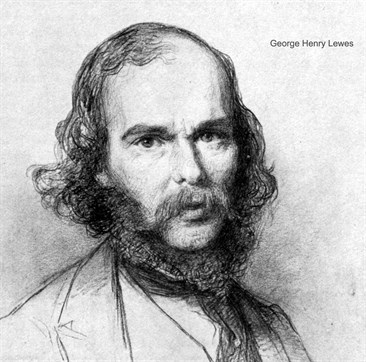Her Life
The George Eliot Fellowship
London
Following Marian's return from Geneva, her publisher John Chapman invited her to take lodgings in his London home, 142 Strand, another meeting place for intellectuals, scientists and radical reformers of the day such as Charles Dickens, Charles Darwin, Wilkie Collins and Karl Marx.
 Adapted from the cover of Rosemary Ashton's '142 Strand' (Chatto & Windus, 2006); the portrait is of John Chapman.Chapman asked Marian to become Assistant Editor for his journal, the Westminster Review. There is some evidence that during this time she became Chapman's lover. His wife Susanna had learnt to live with his mistress in the same house, Elizabeth Tilley, the children's governess, but another one, vying for the affections of the handsome John Chapman was intolerable to both wife and mistress who forced Marian to return to Coventry. Chapman later persuaded the two women that the success of his Westminster Review depended on Marian's editorial skills, as indeed it did. Grudgingly, the two women allowed her to return. Thus began five years packed with hard work, vast amounts of reading and stimulating new friendships with leading reformers and intellectuals of the day such as Bessie Parkes, Barbara Leigh Smith, Herbert Spencer and George Henry Lewes. In effect Marian became the Editor of the Westminster Review, but she also found her voice as a writer of reviews for the quarterly journal, each issue carrying about a hundred book reviews ranging from contemporary literature to philosophy and science. Everything was being rethought: religion, geology, slavery, women's rights, Ireland, the role of hereditary peers in the House of Lords and the reform of the voting system.
Adapted from the cover of Rosemary Ashton's '142 Strand' (Chatto & Windus, 2006); the portrait is of John Chapman.Chapman asked Marian to become Assistant Editor for his journal, the Westminster Review. There is some evidence that during this time she became Chapman's lover. His wife Susanna had learnt to live with his mistress in the same house, Elizabeth Tilley, the children's governess, but another one, vying for the affections of the handsome John Chapman was intolerable to both wife and mistress who forced Marian to return to Coventry. Chapman later persuaded the two women that the success of his Westminster Review depended on Marian's editorial skills, as indeed it did. Grudgingly, the two women allowed her to return. Thus began five years packed with hard work, vast amounts of reading and stimulating new friendships with leading reformers and intellectuals of the day such as Bessie Parkes, Barbara Leigh Smith, Herbert Spencer and George Henry Lewes. In effect Marian became the Editor of the Westminster Review, but she also found her voice as a writer of reviews for the quarterly journal, each issue carrying about a hundred book reviews ranging from contemporary literature to philosophy and science. Everything was being rethought: religion, geology, slavery, women's rights, Ireland, the role of hereditary peers in the House of Lords and the reform of the voting system.
 But it was meeting George Henry Lewes that was to transform her life for ever. A polymath if ever there was one, Lewes had published histories of philosophy, natural science, plays, novels. An irrepressible raconteur he had acted in Dickens' amateur dramatic society. Lewes's charm, like his intelligence, was inescapable. Their friendship deepened into love. Although married, Lewes no longer lived with his wife Agnes and their sons. The family had lived in a bohemian community in Bayswater and Agnes had given birth to two more children fathered by Thornton Hunt, Lewes' business partner and best friend. Because Lewes had registered these children, it meant he condoned the situation; and, in those days, it also meant he forfeited his right to divorce.
But it was meeting George Henry Lewes that was to transform her life for ever. A polymath if ever there was one, Lewes had published histories of philosophy, natural science, plays, novels. An irrepressible raconteur he had acted in Dickens' amateur dramatic society. Lewes's charm, like his intelligence, was inescapable. Their friendship deepened into love. Although married, Lewes no longer lived with his wife Agnes and their sons. The family had lived in a bohemian community in Bayswater and Agnes had given birth to two more children fathered by Thornton Hunt, Lewes' business partner and best friend. Because Lewes had registered these children, it meant he condoned the situation; and, in those days, it also meant he forfeited his right to divorce.
To allow their friendship and love affair to develop, Marian moved into rooms at 21, Cambridge Street. On 20th July 1854, George Henry Lewes & Marian Evans left for the continent as a married couple. They were to spend eight months abroad, three of them in Weimar where they fell under the spell of Liszt who was living openly with his mistress the Princess Wittgenstein. In the free-thinking atmosphere of liberal Europe they were accepted by everyone. Life was full: together they read Shakespeare, novels and poetry; Lewes worked on what was to become a highly acclaimed biography of Goethe (still in print today); and Marian continued to write major articles for The Westminster Review.
On returning to England they set up home together, but for many years Marian was not accepted in mixed society, even London literary society. Lewes was invited to dinner parties: Marian was not. But Marian had a clear-eyed response to what they had done: 'light and easily broken ties are what I neither desire theoretically nor could live for practically. Women who are satisfied with such ties do not act as I have done - they obtain what they desire and are still invited to dinner'. (Letters Vol II). However hard it must have been for Marian, perhaps for a time this suited her as she was naturally less sociable than Lewes and the social ostracism meant she could devote her time to reading and writing.
Marian wrote to her brother to inform him that she was now 'Mrs Marian Lewes'. Isaac Evans made his own enquiries. Upon discovering the union was not official, Isaac instructed the family to break off relations, an instruction which was to last until the death of Lewes in 1878.

